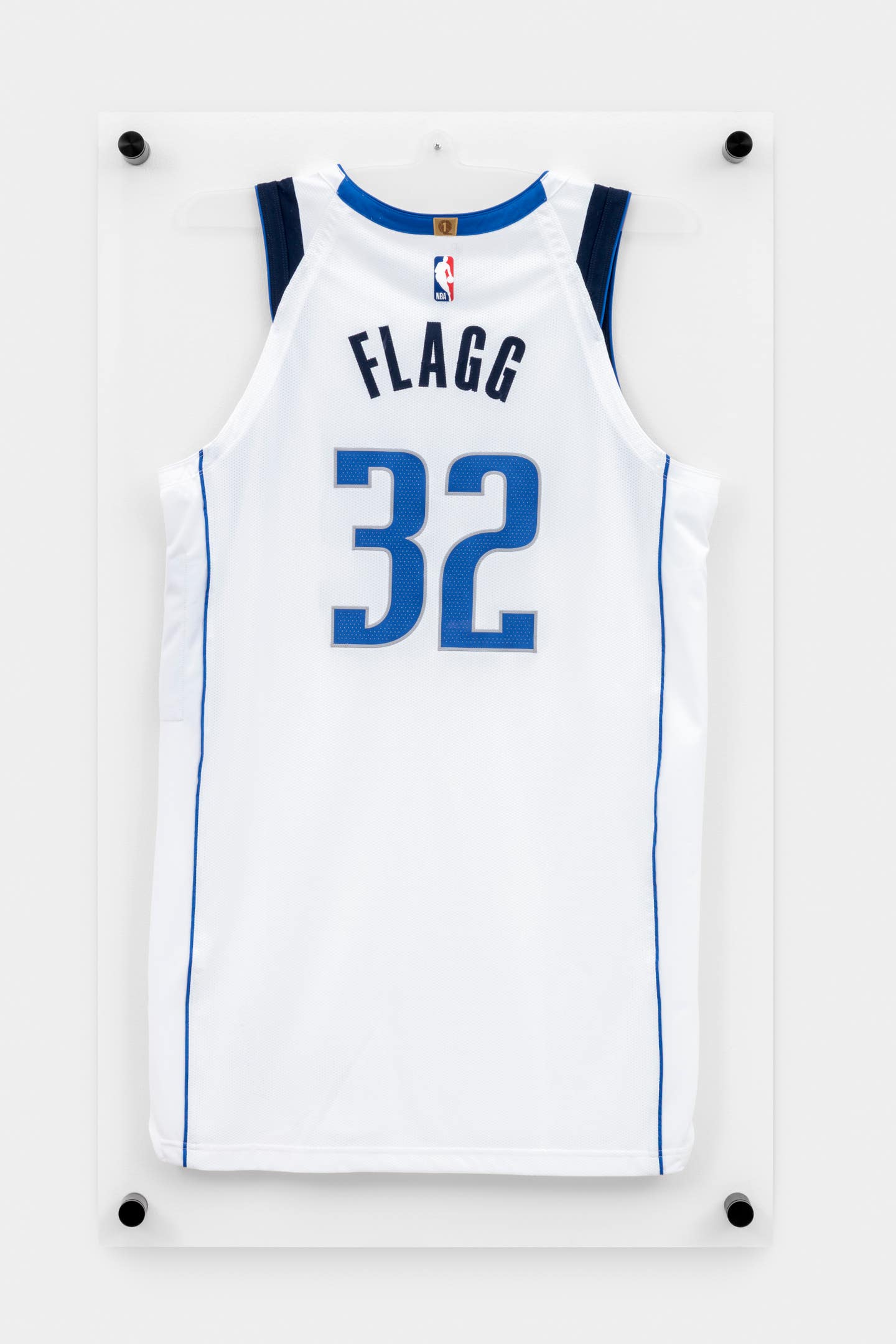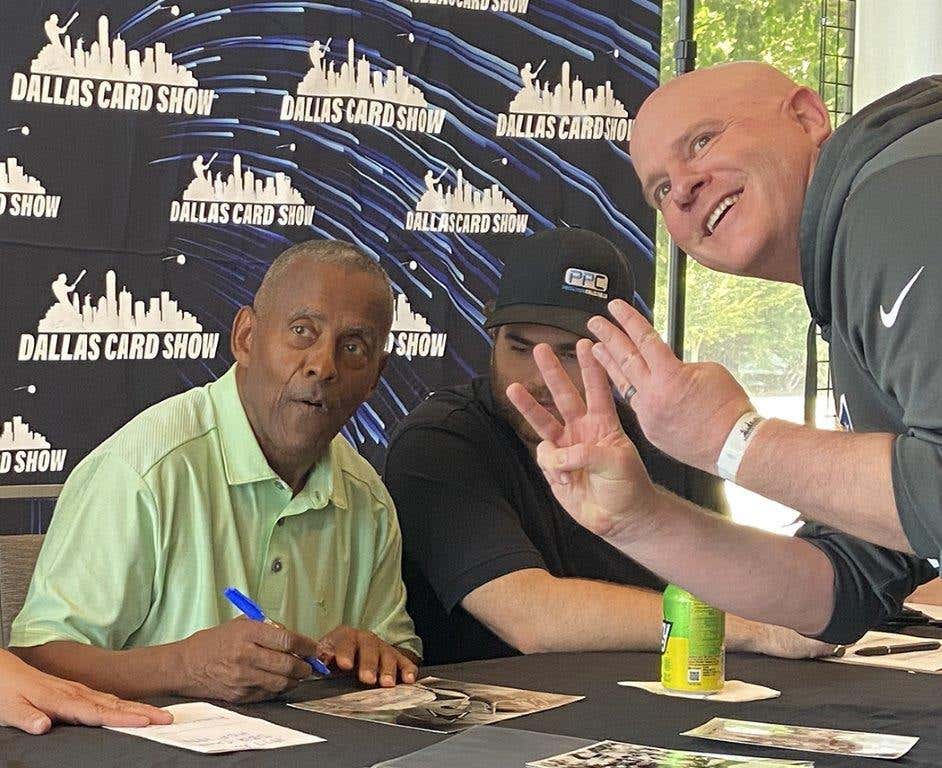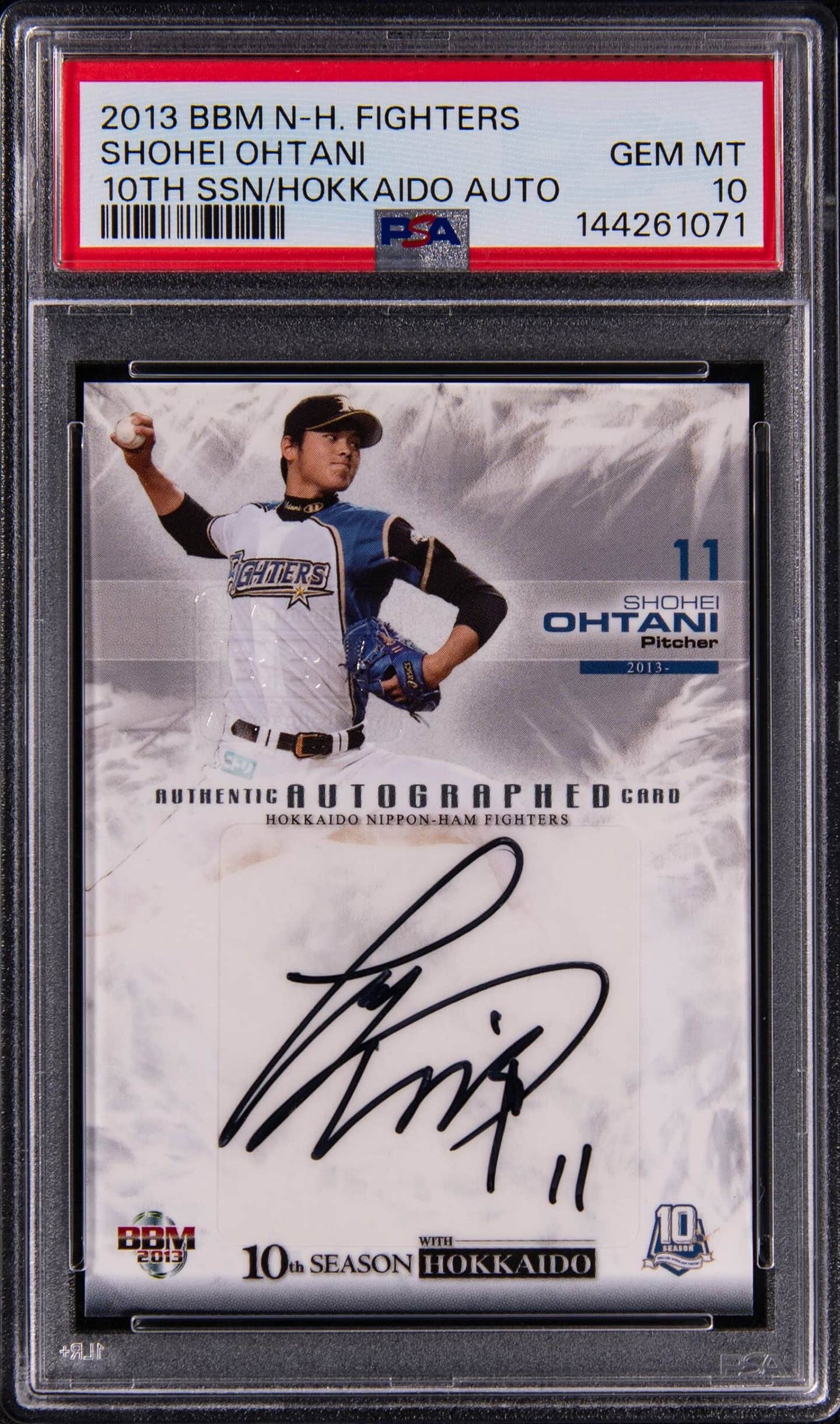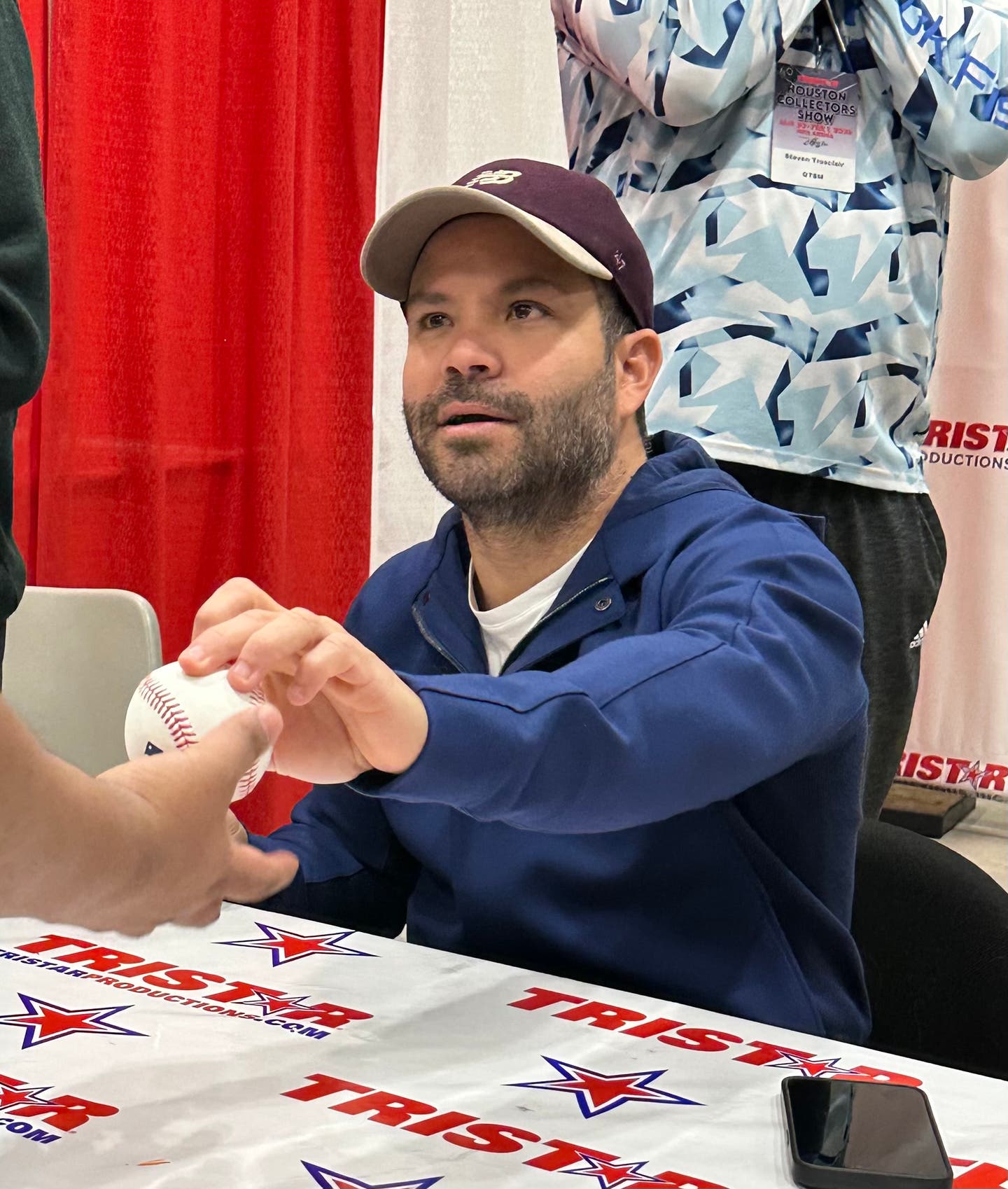Memorabilia
A Night with a Living Legend: Andre Dawson
By Mike Shannon
When the people at Louisville Slugger Museum & Factory throw a party, they do it right – as anyone in attendance at the kickoff of the 12th Annual Louisville Slugger Auction Weekend this past November can tell you.
Approximately 250 guests were on hand for the presentation of Louisville Slugger’s “Living Legend Award,” which is the official kickoff to the big weekend that includes the Saturday auction of baseball memorabilia at the world’s most famous bat factory. The recipient of the Living Legend Award, the ninth in the history of the prestigious award, was former Montreal Expo and Chicago Cub outfielder Andre Dawson. “The Hawk” did not disappoint. He impressed everyone with his humility and friendliness, making the event a memorable, exciting night that will not be soon forgotten.
The staff at Louisville Slugger takes great pains in selecting the player to receive the Living Legend Award each year, as Vice President and Executive Director Anne Jewell indicated in remarks previously announcing the choice for 2015.
“Andre Dawson showed great perseverance throughout his career, and we’re proud to count him as part of the Louisville Slugger family. The Living Legend Award was created to honor a player who exemplifies greatness both on and off the field, and Andre is a terrific representative on both counts.”
In her opening statements, Jewell specified the non-baseball things about Dawson that most impressed: his 37-year marriage to Vanessa Turner and his devotion to two charities, the Alzheimer’s Association and the Dade County Sickle Cell Foundation.
Dawson’s playing resume, of course, needed no recounting. His 2,774 hits, eight Gold Gloves, four Silver Slugger Awards and his status as one of only three players in history with more than 400 home runs and 300 stolen bases assured his enshrinement into the National Baseball Hall of Fame, which occurred in 2010.
Prior to the commencement of the program, guests had plenty of opportunities to participate in a silent auction of baseball memorabilia, to get a free appraisal of their own baseball memorabilia and to study the large and varied array of impressive baseball items arranged in tall standing display cases and behind cordoned-off areas that were awaiting the big auction the following day, conducted by Hunt Auctions.
The relationship between Dawson and Louisville Slugger goes back a long way, and as a reminder of that, a brief video was played. Years before, Jewell had interviewed Dawson at the Ted Williams Museum. The video replayed Dawson’s answer to Jewell’s question of what signing his first bat contract with Louisville Slugger had meant to the young player.
“It felt like I’d finally arrived, seeing my signature on a Louisville Slugger bat,” Dawson said. “Even though I was still a minor leaguer, it made a statement, gave me confidence. At that point I was a professional baseball player, looking forward to the days ahead.”
A second video formally kicked off the presentation. The soundtrack to the video was the reading of a poem called “Memo to Mattie and Eunice” – the title refers to Dawson’s grandmother, who raised him, and his mother, who gave birth to him when she was very young. The images in the video corresponded wonderfully to the words of the poem.
Jewell then brought to the stage the man who would introduce Dawson, Al Oliver, himself a former outstanding major leaguer who was a teammate of Dawson’s when they both played for Montreal. Many fans believe Oliver is a Hall of Fame quality player – he batted .300 or better 11 times and made seven All-Star teams. Rather than become bitter about this continuing disappointment, Oliver is doing something positive with his life, serving as a deacon in his Portsmouth, Ohio, church and doing his best to convince young people to reject the many negative influences they face today and do something constructive with their lives.
Based on his credentials, his relationship to Dawson, his faith in God and his attitude towards life, Oliver was the perfect person to introduce “The Hawk.”
Oliver began with a few instances of levity, saying, for instance, “It’s been a great day in Louisville. I walked into the lobby of this fabulous hotel downtown, and I didn’t even get the words ‘Al Oliver’ out of my mouth before they were handing me the key to my room. I thought, ‘I’m back in the big leagues!’ ” He then recounted the beginning of his relationship with Dawson, saying, “I’d heard about The Hawk and was curious about him, and then I got to see what he’s like when I went to Montreal in 1982. There was something about Hawk’s demeanor and spirit that made us click, and it dawned on me that it was a spiritual thing, that he believed as I do that there is such a thing as God. The players believe that it’s only themselves doing the wonderful things on the field without ever considering that it’s God who gives us the gifts to be great athletes. Hawk never took it for granted.”
Oliver went on to discuss a number of germane topics, such as Dawson’s wife Vanessa, the laborious rehab Dawson underwent on both knees before and after every game and the idea that a long career in Major League Baseball such as Dawson’s is tantamount to a valuable education in human nature. Particularly well put was Oliver’s description of Dawson’s motivation for signing a blank contract as a new Chicago Cub: “Hawk was not into breaking the bank. He was into playing the game and playing it well. He didn’t demand much but playing time.”
Throughout his talk, Oliver kept coming back to Dawson’s Christian faith and its effect on his friend’s character, stating near the end of is speech, “I’m glad he was raised in a spiritual home because that’s why he was able to become a Hall of Famer.” Oliver concluded by saying, “If you have five real friends, you’re lucky. I’m glad Andre is my friend. The Hall of Fame is out of my hands. God is in control of that, as he is in control of everything. But I know what a Hall of Famer is. That’s Hawk Dawson.”
Oliver then called Dawson to the stage to hand him the beautifully made “Living Legend” 10k gold ring housed in a hand-crafted wooden display box that lit up when opened. “On behalf of Louisville Slugger, I present this to you,” Oliver said. “Our friendship will last forever, unconditionally.”
After the two former major league stars hugged, the stage belonged to Dawson. He spoke softly and carefully, as if he were considering each and every word. He made his thank-yous to Oliver, Jewell and to the Hillerich family.
“I’m sure I’ll use only a fraction of the time that Al spoke here. As you know, Al is a minister, so he’s used to talking in front of people ... that’s the only part that didn’t rub off on me.”
After pausing to allow the chuckles to subside, he said, “I speak from here,” as he pointed to his heart. “My wife said, ‘Don’t ramble.’ She also told me to remember the five keys to public speaking. ‘Five keys?’ I said. ‘Yeah. Be brief, brother, be brief,’ ” she said.
Vanessa Dawson’s advice produced a hearty laugh, but her husband was not intent on doing stand-up comedy. He continued instead to quietly explain himself to the crowd.
“I’m very much in awe,” he said, “You don’t really know what this means to me. When the video was playing, I almost walked out. That’s how emotional I felt.”
A few moments later Dawson began to reminisce about the loved ones whose memory stirred such emotion in him: the uncle who tutored him in the fundamentals of the game (“He was better than I was I was told”), his mother and especially his grandmother, whom he called “Mama.” It was Dawson’s grandmother who constantly preached the value of education and who urged him “to get on your knees at night and be thankful for your blessings, even before you get them.” Speaking of his grandmother, Dawson said, “The toughest thing I ever had to do was close her coffin.”
Dawson attended Florida A&M University in Tallahassee, but despite his desire and intention to honor his grandmother’s fondest wish for him, when he was drafted by Montreal in 1975, he had to follow his dream.
“I could sign for $2,000 or finish my senior year,” he explained. “It wasn’t a monetary decision. My childhood dream was staring me in the eyes, so it was off to Montreal.”
Dawson mused about how far in the past his career seemed to be and how he was thankful that he’d had such a long career, how he’d beaten the odds of having the on-average four-year stint in the major leagues. He thanked Oliver and others of his ilk for teaching him how to be a dedicated professional who would “leave it all on the field” and who could look in the mirror and know that “you gave it your all.”
He then returned again to the two people most influential in his life. “I never envisioned being a Hall of Famer or a Living Legend,” he began. “It wasn’t about that. On the day I was told I’d made the Hall of Fame I went to visit the gravesite of my grandmother and mother. I’d never done that before. I said a prayer ... I thanked both of them for their role in my life. I shed some tears and told them, ‘What you always talked to me about is coming to fruition.’ It saddened me because they weren’t there. I got the call four hours later. So, as I stand before you tonight, I am very humbled. I am very honored, and I can’t say enough about what this means to me ... more than being inducted into the Hall of Fame.”
He repeated his thank-yous to Louisville Slugger and remembered to acknowledge the expert bat turner (on hand, standing just to the right of the stage) who’d made all those R43s for him that “felt so right, so natural.”
The crowd gave him a rousing ovation, after which Jewell led a question-and-answer session. It had been a wonderful experience all around, and everyone was on a baseball high.
On the way out, guests received one final treat: a color 8-by-10 photograph of The Hawk batting for the Cubs, bearing the logos of Louisville Slugger and the Living Legend Award in the upper right-hand corner, personally signed in blue Sharpie by Dawson.
Naturally, guests wondered who the Living Legend honoree for 2016 might be. Whoever the next recipient turns out to be, the thinking here is that he has a tough act to follow in The Hawk.
Audience Q&A With Dawson
Q: How did you get your nickname “The Hawk?”
A: It was given to me at a very young age by one of my uncles, a very good ballplayer who played a little minor league ball. I’d work out with the men’s teams he played on. I was in the way really, probably more of a nuisance than anything else, but they’d hit me groundballs, and even though the ball would take bad hops and hit me in the face, he could see I was not afraid of the ball. One day he said, “You remind me of a hawk the way you swarm the baseball. You’re not afraid. Keep it up.” Later, people thought it came from my demeanor. They thought I was unapproachable because of my scowl, but it was just my way of concentrating.
Q: I’ve been a Cubs fan all my life. I say if you’d shown up three years earlier in 1984 we win. Whatta ya think?
A: Good point. They were a good team. They shoulda won that year. They were a player away, like yours truly. They were a break or two away from victory over the Padres. This group they have now, they’re good but they’re also a player or two away. You need three shutdown pitchers in your rotation, and with Lester and Arrieta they have two, so if they get another shutdown pitcher they’ll be right there. They have a good young nucleus, but you can’t live by the home run. That’s their main weakness, and it was exposed by the Mets in the World Series. They need to learn from the experience.
Q: How did you like playing in Canada? Do you see Montreal getting another team?
A: I enjoyed playing there, and I was grateful to the Montreal ballclub because they signed me and brought me to the big leagues, although they drafted me in the 11th round. Scout Mel Didier wrote a book, and in one chapter he asked why they waited til then.
The main drawbacks to playing across the border were the cold, the language barrier and the Astroturf, which put a lot of wear and tear on the body. The people there miss the game; they’re hungry for baseball. There’d be a lot of hurdles, a lot of red tape to overcome for baseball to return there. No. 1 being the need to build a new ballpark, but if you’re a billionaire you could pull it off.
Q: Who did you enjoy hitting off the most?
A: There were a whole lot of ’em I enjoyed batting against. However, when you’re struggling, even guys you should hit get you out. It’s a long season, and when you get tired, you develop bad habits and you can get yourself out. But when you’re swinging the bat good, it doesn’t matter who’s pitching.
Q: Did you have a pre-at-bat routine or mindset?
A: Yeah, I did: this guy’s in trouble! I crowded the plate because my strength was hitting the ball on the inside of the plate. I was a pull hitter, but I also tried to be a student of hitting. I didn’t want to adjust to the pitchers’ strengths though. I wanted to make them adjust to my strengths. You tell yourself to have a game plan and don’t go outside it.
Q: Did you have any superstitions, like always rubbing something or touching something or wearing the same thing?
A: Not really, because then you’re in trouble if whatever you’re doing for luck doesn’t work. You have to think if you go 0-4 or worse, 0-10, somebody’s gonna pay. That’s clubhouse lingo: “Somebody’s gonna pay.” And the worse your slump, the more somebody’s gonna pay for it.
Q: What was the worst fit by a manager you ever witnessed?
A: I’d have to say it was by Don Zimmer. We were at Wrigley Field one day, and the ump was having a bad day – missing strikes, calling pitches that were balls strikes. You could see Zimmer’s frustration building in his face, with it getting red and the veins in his neck about to pop. Well, Zimmer couldn’t take it any more after the ump issued a walk to the batter on a pitch that shoulda been called a strike. He goes out there and he and the ump start going at it pretty good, face to face. Zim gets so mad he takes his gum out of his mouth and fires it on the ground. When he looks down, his teeth are on the ground, too, stuck to the gum. The ump looks down at his teeth, and Zimmer says, “Hey, don’t step on ’em! They’re my only pair.”
Zimmer used to let me manage sometimes. He’d call me over and say, “Hawk, I’ve got some good news and some bad news. The bad news is you’re not playing today. I’m resting you. The good news is I’m gonna let you manager the club.”
I loved Don Zimmer to death. He was my favorite manager.
Q: Do you think it’s bad for the Cubs to play all those day games at Wrigley Field?
A: No, not if you get your rest. Chicago is what it is. Rush Street, all the night life there, that’s the problem. We’d love the first game of a home series because the guys on the other teams would always be dragging when they got to the ballpark after being out all night.
I enjoyed playing day games at Wrigley. After the game, I’d go home, get off my feet, take a nap, eat dinner, watch the news on TV, go to bed, and then get up the next day ready to go.
Look, guys don’t complain about playing day games during spring training. Why should they complain about playing day games during the season?
Q: There’s no padding on the walls at Wrigley because they have ivy. What’s your opinion about that?
A: Trust me, I know there’s brick behind that ivy. You get used to it. One time Eric Davis hit a long fly ball and I went back on it and back on it, and all of a sudden the lights went out. When I woke up, I was on the ground. I heard the center fielder Jerome Walton yelling, “It’s next to you! It’s next to you!” I yelled back, “Well, you’d better come get it.”
Q: What’s your favorite memory?
A: Oh, boy. There’s so many games that stand out: the three-home run game, the cycle game. It would probably be the day my son was born. I had the day off in Chicago, and I got to witness his birth. After I knew he and my wife were OK, I went to the game and got to the ballpark around the fourth inning. I pinch-hit, got a key hit that led to a couple of runs and we won the game. I got the game ball and dedicated it to my son, so he’d have a special memento of his birth.
Mike Shannon is a freelance contributor to SCD. He can be reached at spitball5@hotmail.com.








